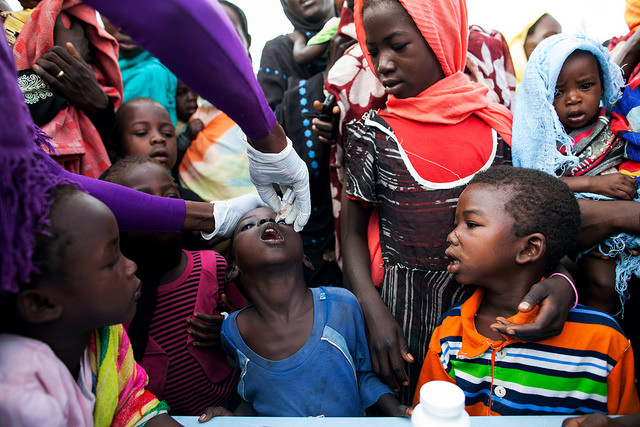
Image: Child receiving the oral polio vaccine | UN
This document is the outcome of a polio partners meeting, focused on community engagement, between representatives from USAID, the Maternal and Child Survival Program (MCSP), the CORE Group Polio Project, The Communication Initiative, John Snow Inc. and the UN Foundation. The meeting was held in February 2018.
The aim of the report is to share learning on communication and community engagement practices from the 30-year global fight against Poliovirus. Community engagement has been vital to tackling Polio in hard to reach communities and challenging environments. The learning shared in the report is not intended to be directive, but to offer strategic insights and support development of engagement practices during health interventions.
The report highlights some things to be aware of: firstly, polio eradication has been a fairly political issue in certain environments, with polio health workers the targets of fatal attacks in some locations. Also, the effort to eradicate polio has received relatively high levels of funding compared to many other public health and development issues.
The report discusses learning on five major themes, each of which is summarised briefly here:
Social mobilisation
Social mobilisation is highlighted as a powerful driver of positive development. The report places an emphasis on local engagement and mapping of existing community networks, as well as the value of multi-pronged approaches to reach a wide variety of social groups.
Norms & culture
In any development activities, the challenge of how to respect local culture whilst working to alter norms that go against public health goals is prescient. An example of this highlighted in the report is how female vaccinators are often required, but in certain cultures women are unable to travel alone, or visit other houses, etc. There are many factors to consider when dealing with culturally sensitive issues, including:
-
Gender roles & expectations
-
Local communication patterns
-
How to gain the trust of specific communities, for example with vaccinations, how to convince parents the vaccinations are safe. A successful example of this is how community mobilisers have had their children vaccinated publicly, to demonstrate the safety of the intervention.
Community-based surveillance
The report highlights the value in establishing or utilising networks of community ‘informants’, to provide researchers and practitioners with information on the current health situation. This helps to reduce the time taken between the onset of a disease and reporting, as informants are already on the ground. It improves trust and empowerment between communities and researchers, and improves the sustainability of interventions.
Use of data
The report discusses successful data collection methods that have helped with efforts to eradicate polio. Many have used communication and community engagement methods to collect the best data available. This includes the development of non-traditional data collection methods, such as Lot Assured Quality Samples (LQAS) methods, which are adapted to specific communities.
Operational oversight
The importance of external evaluation of activities is highlighted. This ensures progress and accountability, can offer new insights and potential solutions, and allows sharing of best practice. The report argues that the key word for operational oversight activities is ‘why’, eg. ‘why was the target missed?’, ‘why did this intervention fail?’. This allows for the unearthing of the underlying problem, and the proposal of solutions.
The report concludes that, while communication and engagement activities only accounted for 8% of the 2017 and 2018 GPEI budget, these activities offered huge value to the overall effort to eradicate polio. It therefore argues that this can provide a strong case for 8% being the minimum budget proportion given to engagement activities.
Read the whole report here (web) or here (PDF).

This work is licensed under a Creative Commons Attribution 4.0 International License.

Please Sign in (or Register) to view further.